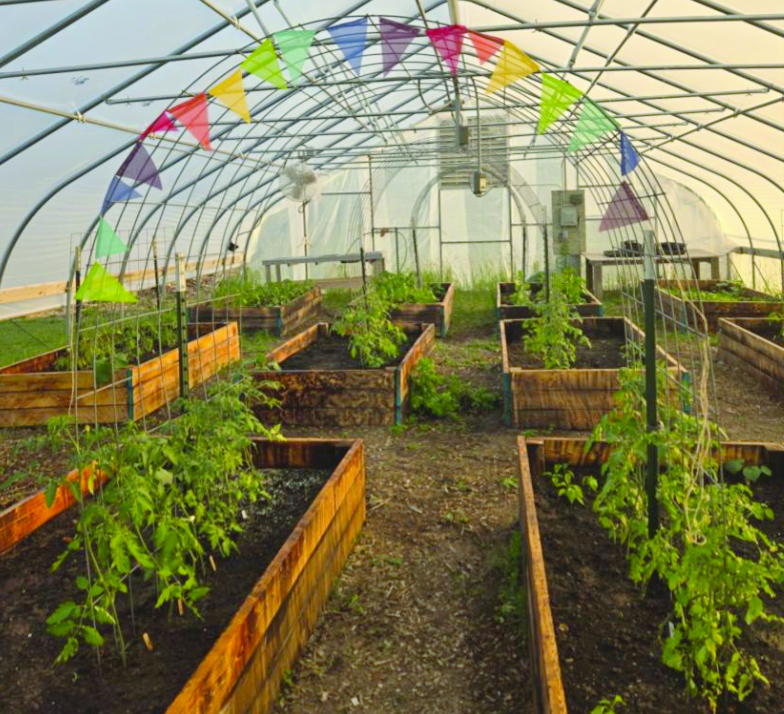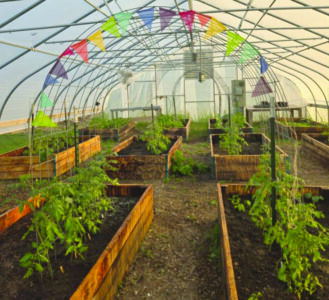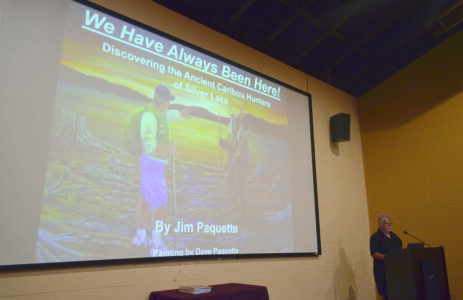Student-led projects bring local food to school lunchrooms

The Munising School Hoop House now has raised beds and other updates to improve accessibility. (Photo courtesy of Hilary Ludecke)
CHATHAM — The Locally Integrated Food Teams – Upper Peninsula program had another successful year, with local high school students developing a project to get more local food into their school lunchrooms.
According to a Wednesday press release, grant proposals were written by three schools – Negaunee, Munising and Ishpeming High Schools – and the schools received $2,500 in grant money to support projects that were developed by the students.
At Munising High School, Hilary Ludecke’s Environmental Science class worked as a team with knowledgeable adults to replace the hoop house plastic, add an irrigation system, build raised beds, and improve soil health in their school garden. Guidance about how to accomplish these updates and what to grow was provided by Yooper Country Farm. In the spring, the class began taste testing new recipes that feature local foods that could make their way to the lunchroom. Crops like potatoes, lettuce, string beans, peppers, tomatoes, and even some fresh herbs — all of which they hope to source from their hoop house or from local growers. The progress this year not only lays a strong foundation for classes to come, but it will give the students valuable hands-on experience with growing and preparing food.
At Negaunee High School, Todd Backlund’s Environmental Science class went to work rebuilding their school garden beds and bringing in fresh soil, creating a refreshed and improved area for growing. They also expanded their garden to attract and host pollinating insects. These little friends will be able to feast on some flowers while also lodging in new insect hotels. Along with the garden, students also focused on including local foods in health education through communication with their teachers about what is included in the nutrition curriculum. The grant was also used to purchase a new salad spinner for their cafeteria. This was purchased with the goal of making it easier for the staff to get greens grown in the school’s hydroponic system into the lunchroom and on the plates of students. This part of the project is a continuation of a prior project that helped them acquire the hydroponic systems. Students at Negaunee are not only laying strong foundations, but they are also looking at how they can build on these foundations in the future.
At Ishpeming High School, Melissa Meldrum’s Senior English class turned their focus to education in collaboration with Partridge Creek Farm. The students developed recipes and provided taste tests to their classmates and elementary school students of delicious and nutritious food, and passed information about how those recipes were received along to their foodservice director. The local foods featured included carrots grown at Michigan State University U.P. Research and Extension Center and potatoes that students helped to grow at Partridge Creek Farm, which were processed at Northwoods Test Kitchen. They have also been working on educating their fellow students on how to properly compost so that the nutrients that are not eaten are put to good use, continuing a collaboration with Partridge Creek Compost. Two paid internships at Partridge Creek Farm are underway, where students are growing vegetables that will be served in the cafeteria in the fall. This experience has deepened Brynn Way-Lanala’s understanding of food, “I’ve learned different vegetables and gotten to see the whole life cycle of plants through this internship,” included Way-Lanala in the press release.
The potential impacts of this internship also look forward to the future, “I want to be a teacher, and my experience with this project means that I will bring kids to gardens and teach them what I’ve learned here,” said Partridge Creek Farm intern Journey Comment.
A celebration of student work was hosted at Belsolda Farm, where students from each school presented their projects to one another. They learned about opportunities to continue to study agriculture at MSU’s Institute of Agriculture Technology program at Bay College and were treated to a local food lunch provided by Northwoods Test Kitchen.
None of this would be possible without LIFT-UP’s community partners: The U.P Food Exchange, Fork Farms, Partridge Creek Farm, Michigan On-Farm Produce Safety, Northwoods Test Kitchen, Chartwells, Marquette-Alger RESA, Michigan State University Extension, and The Marquette Food Co-op.
The partners from these organizations helped the students make real world connections and brought priceless knowledge and experience to the classroom.
This project was supported by funding from Michigan Health Endowment Fund’s Nutrition and Healthy Lifestyles grant program.





